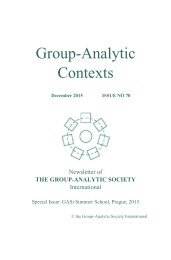Group-Analytic Contexts, Issue 80, June 2018
Create successful ePaper yourself
Turn your PDF publications into a flip-book with our unique Google optimized e-Paper software.
Newsletter – Summer <strong>2018</strong> 17<br />
4. Exploration together with hope;<br />
5. Integration and realism.<br />
Development was conceptualized as cycling through these<br />
phases when confronted with different challenges and with the<br />
recognition of the therapist’s own limitations and inadequacies<br />
(Rønnestad, 2013).<br />
Countertransference<br />
Countertransference processes are present regardless of clinicians'<br />
theoretical orientation (Betan et al., 2005) and the analysis of<br />
countertransference is on-going work for the group analyst. Often<br />
encountered are 'the inability to deal with dependence', 'deviating to<br />
individual work in the group', 'guilt feelings when lack of progress',<br />
'the Pygmalion Complex' and 'the wish for personal gratification'.<br />
With the very disturbed patients many difficulties go back to<br />
the introduction of the patients and the initial preparations.<br />
Clinical vignette I<br />
For an 18-month closed group I included seven patients referred<br />
continuously. The last person was a 21 year-old man, who was sent to<br />
group analytic treatment after being rejected from therapy in another<br />
clinic at the hospital, mainly because he was found to have no<br />
personality disorder. He was late for assessment, critical of the system,<br />
complained about the rejection and aired the idea that he had<br />
Asperger's syndrome. He wrote in a letter to me, that he ‘hated groups’<br />
and that ' I usually get my way’. When I, during assessment, was<br />
reluctant to include him, he cried and said that he did not know then<br />
how to get help.<br />
He didn’t show the first two times in the group and was late<br />
for another five times during the first thirteen sessions. He talked<br />
frequently, commented on nearly every other comment, mostly in a<br />
very advisory way. He several times stated that the interventions I<br />
made about the similarities in the group, was not for him.<br />
He was critical towards me and, for example, devalued my<br />
interpretations about his late-coming as ridiculous. At a time he got<br />
into an argument with some others from the group about the behaviour<br />
of non-ethnical Danes. After that, he didn’t return to the group,<br />
dropped out (after 6 months) and did not answer my mails. He rejected<br />
my invitation for an individual session. I terminated his therapy and<br />
wished him good luck. Three months later an official complaint<br />
reached my desk: I had made a wrong diagnosis, given him the wrong













